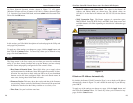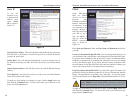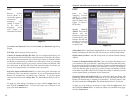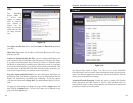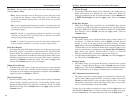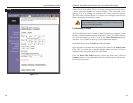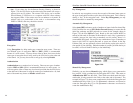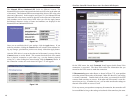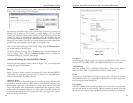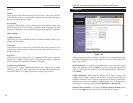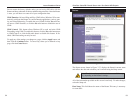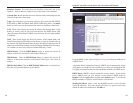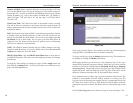
EtherFast
®
Cable/DSL Firewall Router with 4-Port Switch/VPN Endpoint
4342
Remote Security Gateway
The Remote Security Gateway is the VPN device, such as a second Firewall
Router, on the remote end of the VPN tunnel. Under Remote Security
Gateway, you have three options: IP Address, FQDN, and Any.
• IP Address - If you select IP Address, as shown in Figure 7-17, enter the
IP Address of the VPN device at the other end of the tunnel. The remote
VPN device can be another Firewall Router, a VPN Server, or a comput-
er with VPN client software that supports IPSec. The IP Address may
either be static (permanent) or dynamic (changing), depending on the set-
tings of the remote VPN device. Make sure that you have entered the IP
Address correctly, or the connection cannot be made. Remember, this is
NOT the IP Address of the local Firewall Router, but the IP Address of the
remote Firewall Router or device with which you wish to communicate.
• FQDN (Fully Qualified Domain Name) - If you select FQDN, as shown
in Figure 7-18, enter the FQDN of the VPN device at the other end of the
tunnel. The remote VPN device can be another Firewall Router, a VPN
Server, or a computer with VPN client software that supports IPSec. The
FQDN is the host name and domain name for a specific computer on the
Internet, for example, vpn.myvpnserver.com.
Figure 7-17
Figure 7-18
Instant Broadband
®
Series
Under Remote Secure Group, you have two additional options: Host and Any.
• Host - If you select Host for the Remote Secure Group, then the Remote
Secure Group will be the same as the Remote Security Gateway setting:
IP Address, FQDN (Fully Qualified Domain Name), or Any. (Remote
Security Gateway settings are explained on the following page.) In the
example shown in Figure 7-15, the Remote Secure Group is the same as
the Remote Security Gateway, set to a specific IP Address.
•Any- If you select Any for the Remote Security Group, as shown in
Figure 7-16, the local Firewall Router will accept a request from any IP
address. This setting should be chosen when the other endpoint is using
DHCP or PPPoE on the WAN side.
Figure 7-15
Figure 7-16




